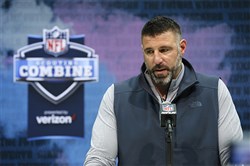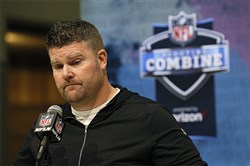VOL. 44 | NO. 16 | Friday, April 17, 2020
Drafting for an NFL season that might never be played
By Terry McCormick
Are NFL teams using next week’s draft to fill their roster needs for one year or two? It’s a question that’s never been relevant with previous drafts, but these are unprecedented times thanks to the COVID-19 pandemic.
There is a very real possibility there will be no 2020 NFL season. There is no social distancing in football, with every player on the field making contact – exchanging spit and sweat in the process – with one or more opposing players on every play.
The bottom of a goal-line dogpile could be deadly.
One player testing positively for the virus shut down the NBA season earlier this year. And with no proven vaccine likely available before or even during football season, it’s easy to envision the virus spreading through crowded locker rooms, meeting rooms, weight rooms and playing fields.
Mayors in Los Angeles and New York cast doubt Wednesday that any large sporting events or concerts will take place in their cities until 2021.
So with that in mind, do the Titans draft, for example, a running back to replace Derrick Henry?
The 2019 NFL rushing leader would be playing under a franchise tag this season, and the Titans could franchise him again in 2021 under current rules. But if there is no season, would that mean Henry would play under a first-season tag or a second-season tag in 2021?
If it’s a second-season tag, he would make considerably more money. Is that money the Titans are willing to spend on a running back, even one with Henry’s ability and credentials?
Would other players eligible for free agency after the 2020 season be free agents if there is no 2020 season? Do teams draft to replace them or bet an unplayed season would roll contracts forward to 2021?
To say that this year’s NFL Draft will be different from any others would be a vast understatement. Even the actual draft will be like no other.
The pageantry and fan-friendly presence seen on display last year here in Nashville with hundreds of thousands of visitors is gone, replaced by social distancing, Zoom meetings and isolation.
The April 23-25 draft will not be held in Las Vegas, as initially planned, but with all 32 teams making picks in isolation. Tennessee general manager Jon Robinson will announce the Titans’ picks from his living room.

Hundreds of thousands of fans packed the streets of Downtown Nashville last year for the NFL Draft, but this year’s event will be television only thanks to the COVID-19 pandemic. General managers from across the NFL will announce picks from their own homes, with Commissioner Roger Goodell announcing them from his living room. Will his family boo him just to keep the tradition alive?
-- Photo By Mark Humphrey | ApCommissioner Roger Goodell will be announcing selections from his home in Westchester County, New York.
Typical pre-draft routines such as player visits, pro days and private workouts have gone by the wayside, and teams have been forced to adjust.
We saw it a week ago when Alabama quarterback prospect Tua Tagovailoa, recovering from a hip injury, was checked out by the Titans team doctor with the evaluation sent to all 32 teams. Tagovailoa also made a video of himself working out and throwing, hoping to convince teams that he is healthy and worthy of a top 10 pick as he certainly would have been before the injury.
With scouts sidelined and coaches hidden away at home, the Titans and other NFL clubs are having to go more old school even as technology is the thread that will hold this draft together. Tape of college games will definitely have more weight this year than before because in-person meetings and private workouts fell victim to virus precautions.
Tennessee’s approach
Robinson says this approach won’t be new for the Titans, who place more emphasis on game tapes and scouts.
“I think we always try to weigh heavily on our scouts’ opinions on the players,’’ Robinson points out. “That’s why we send them out on the road, that’s why we have them go visit with the coaches, trainers and strength staffs at their respective schools that they’re in charge of. Their information and their input into what the player would bring to our football team is vitally important.
“We try to not get enamored with the measurables, or the testing results of players. I generally watch the film and watch the game tape and try to determine as best as possible – not that I’m always right – if they’re good at football and what role they would have on our team.

Head coach Mike Vrabel and his Tennessee Titans have had a tougher time evaluating talent this year without face-to-face meetings and in-person workouts.
-- Photo By Charlie Neibergall | Ap“Certainly, the measurables, I think, can lead you to either justify your feeling of the player,’’ he adds. “You think the guy is a really fast player and he runs a fast time, then you’re like, ‘All right, that one looks right.’
“If he looks like he plays fast but he runs slow timing-wise, which do you lean on? I tend to lean on the tape more than I do the numbers. So, I would say the lack of that data isn’t paramount, but it’s always good to have that.
“It’s the situation that all 32 teams are in. I would say that all of us are dealing with the same thing, and we’ll work through it accordingly.”
No hands-on access
Titans coach Mike Vrabel once bloodied the nose of a prospect by having him block against him during a pro day. So, yeah, he likes the hands-on approach.
“That’s just something I enjoyed doing, and I thought it would help me with certain players,’’ Vrabel explains. “You try to really study the tape, you try to study the player when you talk to him. We’ve been in contact with players, you try to reach out to strength coaches or coaches that you know and continue to try to build a profile of guys that you want to put on our football team.
“I think that’s something we’re very conscious of, the players that we bring on this team,’’ he continues. “Are they going to be able to exhibit the same characteristics that we’ve shown in two years? The demand that we place on the effort, the finish, the ability to put the team first in all aspects.
“Those are difficult decisions when you don’t have a lot of interaction with players or personal interaction with them through this process.”
Face-to-face results
In-person visits have been important for the Titans during Robinson’s tenure, as many of the 30 prospects the Titans have been allowed to bring annually have wound up being drafted by Tennessee or signed as undrafted rookies.

Titans general manager Jon Robinson is learning the perils of working from home.
-- Photo By Charlie Neibergall | Ap“That’s one of the things that I really look forward to in the spring, is either going to a pro day or having a private workout or the visits that we’re allowed to have here in Nashville,” Robinson adds. “Sitting down across from a prospect is no different really than a lot of other job interviews, and getting to know them as a person. A lot of those questions we’re reliant on – I can’t get answered face-to-face.
“We’re working through with some FaceTime stuff with some of the prospects, as well as reliant on our scouts and the information that they gathered in the fall, and their respective coaches at colleges across the country to really lean on that information that we have, so we can hopefully make the best decision we can for the team.”
Finding underrated talent
With only scouting reports, the game tapes and fall visits to rely on, will some teams unearth gems in the later rounds or find an undrafted player by having done their homework early on before the pandemic took away face-to-face visits? That’s entirely possible, Vrabel acknowledges.
“I think if you do your due diligence, and you’ve got a good scouting department and your coaches are evaluating those players that were non-Combine invites, then maybe you can have a chance to gain an edge on some of those teams that maybe didn’t find a guy, or they saw something in a player from some tape that we didn’t see,” Vrabel adds.
“I think a lot of it, for me, is just to get to know the player that we’re bringing in. The skillsets with a lot of these guys are very similar. It’s important that we’re bringing in the right type of person to our team, (I’m) very conscious of that.
“I’ll speak for myself, but I think I have a responsibility to our players, obviously to our owner, to Miss Amy (Adams Strunk) and to our fans to bring in the right type of player to that team and that locker room. I know that Jon would say the same thing and has said the same thing.”
So the getting-to-know-you process is now limited to Zoom meetings, Skype or emails back and forth, but the Titans seem confident they can glean the right information to find players who fit both on the field and in the locker room.
“That’s what you have to do. You can FaceTime, and some of these guys we can do things on Zoom with them, and talk to them, and set up FaceTime interviews and see what these kids are doing,” Vrabel says. “We can install stuff, you can talk to them and we can try to have these virtual meetings, and that’s where we’re at.
“Everybody is working under the same guidelines and the same rules, and we’ll try to do the best job with the situation that we have.”
The current situation
The Titans veterans were scheduled to begin their offseason program this week with April 20 as the opening date for players to be able to come back into St. Thomas Sports Park. But that won’t happen, meaning any offseason work will be abbreviated and possibly eliminated.
Vrabel and his coaching staff will try to have the players work out and simulate as much as they can on their own. But there is no substitute for being there – especially in a sport where cohesion and chemistry are paramount to success. (Think offensive line play.)
Vrabel and his staff are condensing rather than expanding the playbook. That simplification will be especially necessary for the free agent pickups and the rookies that come on board.
“I think this is an important time to make sure that what you’re telling the players is very important,’’ Vrabel says. “Concise, making sure it’s concise, it’s detailed, it’s clear, it’s able to be presented to them in a way that you’re expecting it to be remotely given to them.
“I think it’s forced us to really hone in on what we’re doing and making sure that we don’t go crazy with this extra time, and that it’s stuff that our players can grasp and ultimately excel at. So, I think it’s been a positive from that standpoint. Like, ‘Hey, what do we need? How much do we need? How much defense? How much offense? How much special teams do we need? How much do we want to present them with whenever it is we have an opportunity to go back and begin to teach them?’
“I’m looking forward to it, I’m excited about it. Just waiting to hear when it’s going to be, what it’s going to look like.”
Home games
Like many of us, Robinson and his staff are working from home and adjusting to sheltering in place.
“I realize now why I leave and go to work early because the morning here with my family is way more hectic,” Robinson says. “So, I’m glad that in a normal workweek with this virus not here I’m usually out of the door, and I don’t have to deal with the morning chaos and breakfast ready and school uniforms and all that stuff.”
The new normal for now has Titans officials, as well as those with other teams, simply at the mercy of a Wi-Fi connection in order to evaluate players and somehow get ready for a season in question.
“I get up and I have a home office that was really used for storage that I kind of cleaned up,’’ Robinson continues. “I’ve got a TV in here and an iPad and my Surface. I’m on the phone way more than I typically am, simply because you can’t walk across the hallway and talk to Vin Marino about where we’re at on the cap. You can’t walk down to Jon Salge’s office and talk about the draft or walk over to Ryan Cowden or Brian Gardner or hop down and see Vrabel.
“I’m calling our staff. I don’t see our equipment staff, I don’t see our video staff, so I sent an email out to them just checking on them and their families,’’ he continues. “There’s a lot of remote communication that’s going on through email and phone calls and text messages that typically doesn’t happen.
“But as far as the workload, we’ve got access to all the video and college film and pro film on our iPads through a Cloud server. I have our database, pro and college, here on my Surface. I’m able to function and evaluate players, and have discussions. Our staff – it’s just different. More different than we’ve ever seen in so many aspects.”